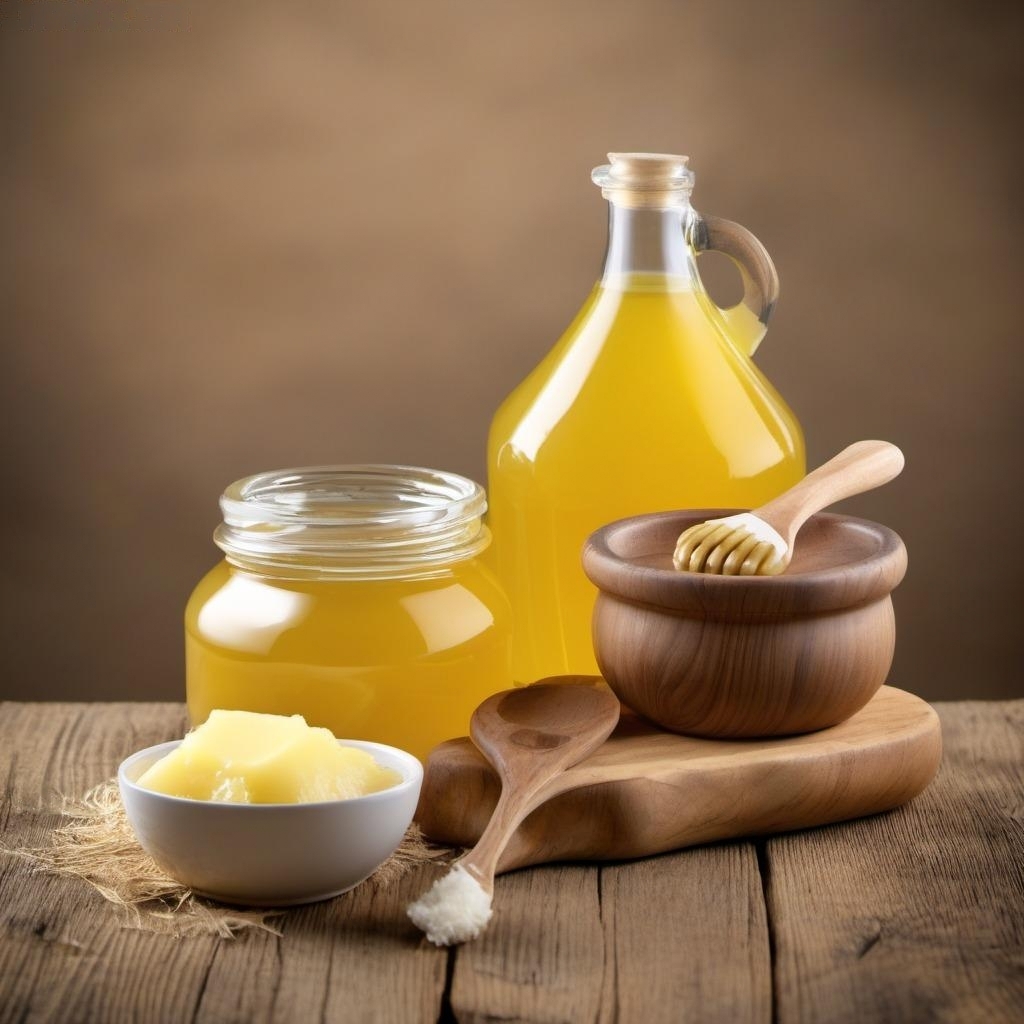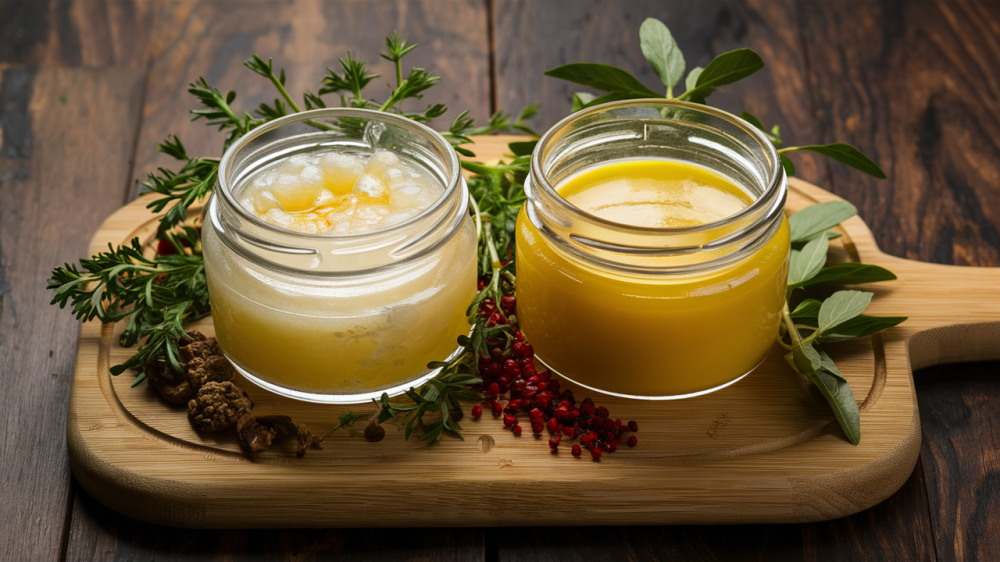The difference between sheep ghee and cow ghee
Ghee is a staple in our traditional Arab cuisine, as it is considered one of the most common types of fats used in food preparation. Ghee is distinguished by its high nutritional value, as it contains a high percentage of healthy fats and nutrients essential for a healthy body. The importance of ghee in cooking lies in imparting a rich and delicious flavor to foods. Ghee is particularly used in preparing desserts, appetizers, and main dishes such as biryani and kabsa. In addition, ghee contributes to giving foods a distinctive flavor and improving their texture and appearance. It plays a major role in the world of Middle Eastern cooking and is considered one of the essential ingredients that are indispensable in preparing delicious meals. Below, we will explain the difference between sheep ghee and cow ghee.
Definition of sheep ghee and its features:
- Sheep ghee is a natural product rich in nutrients that are beneficial to human health. Ghee is obtained from the fat of mature sheep. Workers boil the fat and filter out the skin and impurities to obtain ghee free of impurities.
- Sheep ghee is a rich source of healthy fats, including saturated and unsaturated fatty acids, which are essential for a healthy body. Additionally, sheep ghee is rich in fat-soluble vitamins such as vitamins A, E, and K, which play an important role in supporting the health of the immune system, nervous system, and skin.
- It's beneficial for the heart and blood vessels due to its high content of healthy fatty acids, which work to reduce harmful cholesterol levels in the body. Eating sheep ghee also supports digestive health, strengthens bones and teeth, improves mental function, and maintains healthy eyesight.
- Consume sheep ghee properly. It is recommended to consume sheep ghee in moderation as part of a balanced diet containing a variety of nutrients. It is important to avoid consuming excessive amounts of sheep ghee to avoid excess calories and saturated fat.

You can buy now from Sultan Al-Asal store:
Definition of cow ghee and its features:
Ghee is a food product derived from cow fat and is known for its health and nutritional benefits. Ghee is extracted from the fat of bovine animals by heating and filtering it to produce pure, impurity-free fat.
Advantages of cow ghee:
Cow ghee has several properties that make it an ideal product for nutrition and cooking.
- First, cow ghee contains high levels of healthy fats, such as saturated fatty acids, and essential vitamins such as vitamins A, D, and E, which are essential for a healthy body. It also contains low levels of cholesterol, making it suitable for people with health problems associated with high cholesterol.
- Additionally, cow ghee is known for its ability to withstand high temperatures during cooking, making it suitable for use in cooking and grilling. It also gives foods a distinctive and delicious flavor, captivating everyone who tastes them.
- Finally, cow ghee is considered a sustainable and environmentally friendly product due to its efficient use of cow resources and preservation of ecological balance.

You can buy now from Sultan Al-Asal store:
The difference between sheep ghee and cow ghee in the ingredients:
- Animal fats are among the most important ingredients used in preparing many traditional foods and desserts in the Arab world, and among these fats, ghee holds a special place.
- The main sources of ghee in the Arab world are sheep ghee and cow ghee, which have distinct properties that give each one its own distinct taste and health benefits.
- Sheep ghee has a unique, robust flavor that enhances the flavor of the foods it's added to. It also contains a high percentage of healthy fats, such as linoleic acid, which is essential for cardiovascular health.
- In addition, sheep ghee contains a high percentage of vitamin E, which acts as an antioxidant and protects the body from the effects of free radicals.
- On the other hand, cow ghee has a thicker texture and a less strong flavor than sheep ghee, making it suitable for use in many foods where one does not want to alter the original flavor of the meal.
- Cow ghee also contains a higher percentage of saturated fat than sheep ghee, making it energy-dense and may require caution for those with health problems such as high cholesterol levels.
- Ultimately, both sheep ghee and cow ghee have distinct properties and components that give each its own distinct advantages. We must choose the appropriate type based on our needs and personal preferences, while also taking into account the balance of nutrients and fats present in each type to ensure we reap their benefits without jeopardizing our health.
Differences in taste and smell between sheep ghee and cow ghee;
- Ghee is known to be one of the most important ingredients in Middle Eastern cooking, and is considered a staple ingredient in many delicious and popular traditional dishes. However, there are distinct differences in taste and aroma between sheep ghee and cow ghee, each of which has its own distinct character and adds a unique flavor to the dishes prepared with them.
- Sheep ghee is characterized by its strong, deep flavor, giving dishes a unique and distinctive flavor. This is attributed to the natural nutrition of sheep, which is reflected in the quality of the ghee extracted from them.
- Sheep ghee also has a strong, distinctive aroma that adds great value to the dishes it is used in.
- On the other hand, cow ghee has a milder, less pungent taste than sheep ghee. Cow ghee has a smoother, creamier flavor than sheep ghee, making it suitable for many dishes that require a milder, more delicate flavor.
- Cow ghee also has a milder aroma than sheep ghee, making it a favorite with some who prefer a mild, smooth taste.
- Both sheep ghee and cow ghee have unique properties that enhance the value of the dishes prepared with them. The differences in taste and aroma between the two ghee make each distinct and appealing to culinary enthusiasts with its distinctive flavors.
Health benefits of sheep ghee vs. cow ghee;
1. Nutritional value: Sheep ghee contains a higher percentage of healthy fats and vitamin E than cow ghee, making it a nutritionally better choice.
2. Effect on cholesterol: Sheep ghee contains monounsaturated fatty acids that help lower harmful cholesterol levels, while cow ghee is higher in saturated fats.
3. Anti-inflammatory: Recent studies indicate that sheep ghee may contain compounds with anti-inflammatory properties that promote overall health and reduce the risk of chronic diseases.
4. Ease of digestion: Sheep ghee is lighter on the stomach and easier to digest than cow ghee, making it suitable for people with digestive problems.
5. Digestive effects: Sheep ghee contains lower levels of lactose than cow ghee, making it a suitable choice for people with lactose or sodium intolerance.
Sheep ghee offers a variety of health benefits compared to cow ghee, making it an excellent choice for boosting your overall health and improving your quality of life.
Uses of sheep ghee and cow ghee in different foods;
- When it comes to cooking and enhancing the flavor of foods, sheep ghee and cow ghee are two ingredients that play a crucial role. Widely used in many traditional recipes, sheep ghee adds a rich flavor and depth to dishes.
- Frying and Grilling: Sheep ghee and cow ghee are commonly used in frying and grilling to add a unique, rich flavor to foods such as meat and vegetables.
- Bread and desserts: In some cultures, cow or sheep ghee is used in the preparation of bread and desserts to give a rich flavor and delicious taste.
- Traditional Foods: Sheep ghee and cow ghee are widely used in traditional foods such as biryani and kabsa to add a unique taste and enhance the texture of the food.
- Sauces and marinades: Sheep and cow ghee can be used to make delicious sauces and marinades that add a special flavor to foods.
- Popular dishes: Sheep and cow ghee are used in preparing many popular dishes, such as manakish and mandi, due to their high nutritional value and unique flavor.
- Sheep and cow ghee have many and varied uses in many foods, making them an essential ingredient for adding flavor and richness to various meals.
Prices and availability in the markets;
- When it comes to sheep ghee and cow ghee, prices and availability vary depending on location and quality. Cow ghee may be more readily available and less expensive than sheep ghee in some markets, but it can vary in quality and flavor.
- The price of each type of ghee depends on several factors, such as the source, production method, and local market supply and demand. It's important to compare prices and quality before making a purchase decision to ensure you get the type that best suits your needs and budget.
- Feel free to consult local vendors or experts for advice on pricing, availability, and differences between the types of ghee available in the market.
Conclusion and tips for choosing the right type according to the use;
- When it comes to choosing between sheep ghee and cow ghee, you should consider the purpose of using these products. If you're looking for a rich, distinctive flavor, sheep ghee may be the ideal choice, while if you're looking for something milder and more balanced in flavor, cow ghee may suit your preferences.
- Don't forget to also consider the quality, price, and availability of each type of ghee in local markets. Choose the type that best suits your taste and needs, and don't hesitate to consult experts for further advice before making your final decision.
You can find more important information on Sultan Al-Asal's blog:

